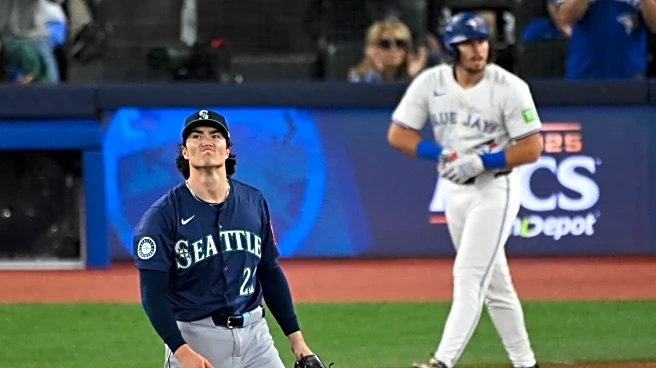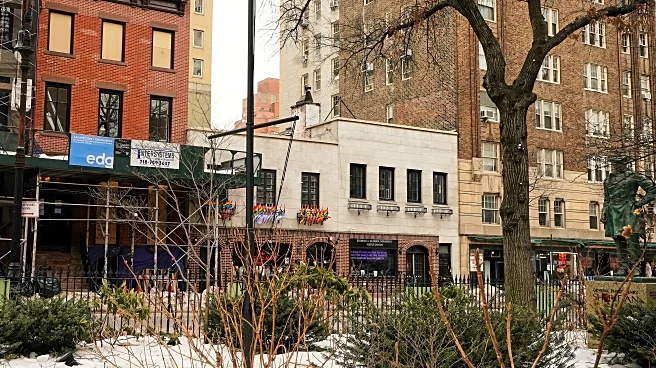It was always going to Game 7.
The Mariners have given fans a magical ride this season, but they haven’t always made it easy. Whether extra-inning games, or late-inning heroics, or winning streaks followed by losing streaks, or pushing things to the make-or-break moments, the Mariners have been playing Game 7 in one form or another…forever, it feels like.
It was always going to Game 7. But it wasn’t always going to be this Game 7.
Of all the narratives that have been spun this postseason—the Blue Jays-Yankees
rivalry, the brilliance of Shohei Ohtani, the otherworldly postseason performance of Vladimir Guerrero Jr.—the Mariners don’t fit neatly into any of them. There’s Cal Raleigh’s historic season, sure, but that interferes with the other narrative about Aaron Judge’s historic career. The Mariners are what happens while narratives are being built around other teams.
But they didn’t back their way into this postseason. They weren’t the best team in baseball this year—they weren’t always the best team in their division this season—but they finished strong. They gave the Blue Jays, the best team in the American League, everything they could handle this series. In the end, it came down to one swing of the bat: one mistake pitch from the normally trusty Eduard Bazardo, someone who had bailed the Mariners out so many times this season. The Mariners were so close, tantalizingly close, to treading ground they’ve never before stood on: their first pennant. Instead, it’s the Blue Jays who get to make some history, making their first World Series appearance since 1993.
The hard part is for a long time, it looked like the Mariners were going to win this game. George Kirby, after scuffling in his last start against the Blue Jays, made an adjustment. He pitched fearlessly in the zone, executed his pitches well, and didn’t let the occasional hard-hit ball or bad-luck result back him off his plan. The one time he wavered, he got punished for it: maybe not wanting to surrender a first-pitch Springer Dinger, he pitched around Springer and issued a leadoff walk instead, which came around to score because the baseball gods were being real sticklers about following the letter of the law this series. But Kirby locked in after that and delivered three scoreless innings after that. He only struck out three, as the Blue Jays put a ton of balls in play, as is their wont, but he managed the contact and his own mindset and turned in one of his better starts of the season.
Meanwhile, the offense steadily built a lead. They scored first, thanks to a leadoff double from Julio Rodríguez off Shane Bieber, who shut the Mariners down over six innings in his last outing. Josh Naylor knocked Julio in with a single for an early 1-0 lead. But last night the Mariners were undone by an unconscionable number of double plays, and there was another key one tonight, as the inning ended on a Jorge Polanco GIDP (despite the best efforts of Josh Naylor to literally put his body in between the ball and first base to break it up).
We might be telling a different story about this game if the second inning had gone differently. The Mariners had Bieber on the ropes, with two straight base hits to lead off the inning. But J.P. Crawford bunted, giving up a precious first out, bringing up Leo Rivas, who struck out on three pitches, and Victor Robles, who went after the first pitch he saw for an easy, threat-killing groundout. It’s not quite a GIDP, but spiritually it feels the same.
The Mariners were able to claw two more runs out of this game, both on solo home runs from, who else, Julio and Cal Raleigh. But that old saying about solo home runs not killing you rang true tonight. Like I said, the baseball gods were insistent on playing by the rules tonight. Both those homers led off innings, so the Mariners didn’t have an opportunity to get people on in front of Julio and Cal, but they also failed to extend those inning into stress innings for the Toronto pitchers. Once again, the offense just didn’t do enough. Three runs might be enough in the regular season against regular teams. It was never going to be enough against the offensive powerhouse of the Blue Jays.
Bryan Woo took over for Kirby and pitched two scoreless innings despite committing the sin of a leadoff walk of his own against the first batter he faced, insistently pounding Andrés Giménez with sinkers inside that he refused to swing at; however, he did wind up facing the minimum thanks to a nifty play by J.P. Crawford. But Dan Wilson tried to coax one more inning out of his starter, and that’s where things fell apart for the Mariners. Once again, Woo walked the first batter he saw, doing the same thing with Addison Barger he did with Giménez, working him inside only to walk him on five pitches. Isiah Kiner-Falefa, who killed the Mariners this series from the bottom of the lineup, showed bunt but got a sweeper hanging on the plate for a base hit up the middle. After an Giménez sac bunt, Wilson called on Eduard Bazardo to face George Springer. And with one swing of the bat—one badly executed pitch—the Blue Jays were suddenly leading, 4-3.
The theme of punishing mistakes/not punishing mistakes was a common thread this series, almost as much as the Mariners’ strong pitching vs. the Blue Jays’ relentless offense. But the Mariners pitching just wasn’t strong enough, either from fatigue or just poor execution. Eduard Bazardo might have thrown the culprit pitch, but in every other loss this series, you could point to similar pitches—not just mistake pitches from Mariners pitchers, but missed opportunities on mistake pitches from Mariners batters. At the end of the day, it just wasn’t enough, even if the Mariners—and their fans—were the team that wanted it more. Maybe especially then.
It was always going to Game 7. But it was never going to be won away from Seattle. There’s no way Seattle fans, the longest-suffering in the sport, could or should be denied the joy of celebrating their first-ever American League pennant on their home turf. (It was also never going to be on a night when the Mariners were relegated to the alternate station on their own home network due to Seahawks Monday Night Football. The Mariners will be the only show in town on the night it finally happens.)
It might not be next year. It might not be the year after. But this core has shown that they have the juice to be here again, and when they are, they’ll be even more experienced. The pitching staff learned they don’t have to carry the entire responsibility for a game’s outcome; the offense learned they can be much more than just enough in wins. Most importantly, this year’s team went further than any other Mariners team has before. They built the bridge, plank by plank, over a canyon of the unknown, and almost got all the way. They drew the map. Now it’s up to the next iterations of this team to follow it. Fans, we know, will follow along no matter what.















